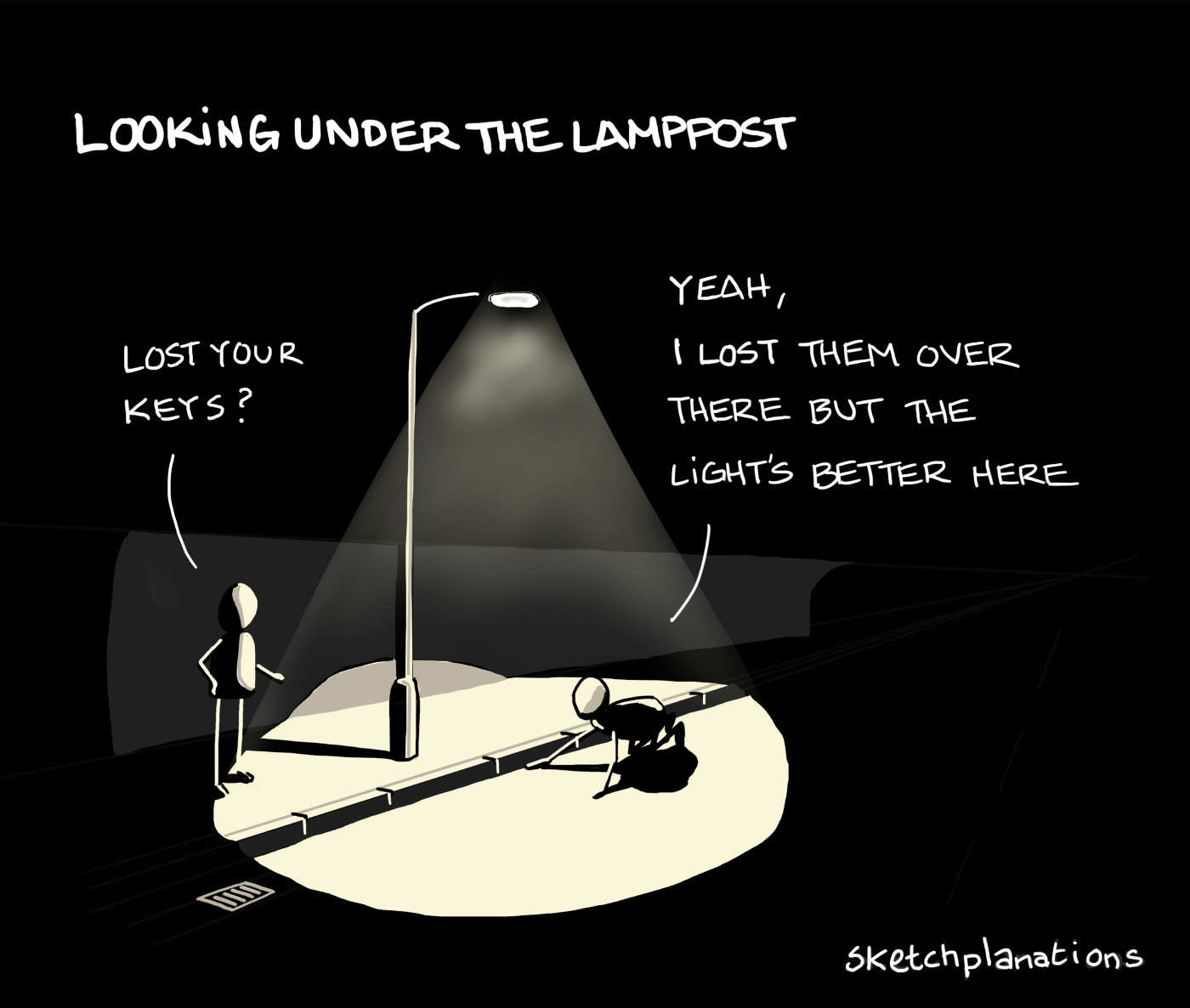Ease of Doing Business Rankings — Searching under the lamppost (REODB3)featured
“In principle, we should measure what we value, yet the reality is often the opposite — we value what we can measure.” From China’s gilded age by Yuen Yuen Ang
When I was running my own software business, I found the coverage of my industry in newspapers remarkably shallow. The reported concerns were rarely the concerns of me or my cofounders. A couple of years ago, I wondered if this was true for other industries and for business in general. So, I met nearly fifty business leaders across the country. Over these fifty meetings, many of which stretched up to two hours, I realized how the worries of these leaders were rarely addressed in Ease of Doing Business discussions in media. Especially, the discussions driven by Ease of Doing Business Ratings. In this post, I will show that not only Ease of Business Ratings do not address the concerns of business leaders, but also that no amount of tweaking of the methodology can change this reality. There is a fundamental flaw at the heart of all such ratings.
I have analyzed the World Bank’s Doing Business ratings in detail. My initial criticism is specific to this methodology. However, the fatal flaw that I point out further down, will be valid for all such ratings.
Let us begin with the fact that the WB DB ranking is not meant for business leaders and investors.
Doing Business is not for Business Leaders
I have never seen any business person refer to the Ease of Business ranking while making an investment decision. This, not only in media reports but also in my fifty interviews. Turns out that the Doing Business Ranking is not supposed to be an input in investment decision making. The foreword of 2020 Doing Business from the President of the World Bank group says this explicitly
‘It’s important to note that Doing Business isn’t meant to be an investment guide, but rather a measurement of ease of doing business.’
Doing Business is an analysis of the regulations that impact business.
‘The Doing Business indicators are based mostly on laws and regulations: approximately two-thirds of the data embedded in the Doing Business indicators are based on a reading of the law.’
When I understood that Doing Business was meant to guide policy makers, I assumed that it would focus on concerns of business leaders. Turns out that I assumed wrong. Doing Business is so focused on regulations that it does not even talk to business leaders! As the 2020 report says
‘Because of the focus on legal and regulatory arrangements, most of the respondents are legal professionals such as lawyers, judges, or notaries.’
DB does talk to business professionals such as accountants, architects, engineers, freight forwarders, etc. but these conversations are only related to factors such as paying taxes, dealing with construction permits, trading across borders, and getting electricity. I agree that these are relevant factors. But they are by no means crucial factors for most businesses, as I will discuss further.
Before that, let us look another significant criticism. Even for a large country like India, the WB index focuses on just two cities.
Doing Business is unrepresentative
As has been widely commented upon, the DB scores are calculated at only two places in India. In Mumbai and Delhi. These cities are very different from rest of India. Take registering property for example, which is a component of the rating. Can you imagine the procedures in Mumbai being anywhere representative of procedures in rural Bihar or for that matter in a village anywhere? The internet is filled with stories of people trying to change the status of agriculture land, a challenge not likely to be faced in Mumbai. And yet, rating of India is based just on Mumbai and Delhi. But that is not the only reason DB is unrepresentative.
As is well known, India has lagged in manufacturing. Our share of employment from manufacturing is really low. Now, it is very difficult for new manufacturing capacity to come up in these mega cities. So not only is Doing Business rating unrepresentative because Mumbai is very different from a village in Bihar. But also, Doing Business does not meet the urgent needs of India. The ratings are being computed for cities which neither can get nor aspire for new manufacturing facilities.
In face of this criticism, Doing Business points out that they have subnational rankings which should be looked at. However, the national rankings that compare India — with a population of more than 1.3 billion with Latvia (population 1.9 Lakh) or Azerbaijan (population 1 Crore) get a lot more traction in the press as far as I can see. So, this defense is bit disingenuous. I understand that Doing Business will be including more cities in India soon. However, this will not really solve the problem because of issues that I discuss further down.
In any case, there are other serious issues with Doing Business. Mainly, their ignoring of very important factors and them having too many factors.
Missing important factors
There are eleven factors and forty-one sub factors used in calculating the Doing Business score. In my meeting with business leaders, most of these factors never came up. The biggest concern in the minds of these leaders was demand. Most of them felt that if they had more demand for their products or services, their businesses would grow. Now the demand for a product is related to the price. For example, demand for high quality flats in Mumbai is huge but not at current prices which are higher than those in most other cities in the world. Many businesses cannot reduce prices for their products because of high costs. One such cost that came up in many of my interviews was delay in payments. If your customers do not pay you in time, you have to borrow money to meet your expenses. The cost of this borrowing can severely dent your profits and many times even kill your business.
And yet, delay in payments is not a part of Doing Business criteria. The 2020 report states that they would be including Government procurement as one of the criteria in future but as far as I can make out, the government delaying payments is not something they would measure.
Ajay Chibber, writing in Business Standard, used the illuminating phrase ‘Ease vs. cost of doing business in India.’ Most times, cost of doing business is order of magnitude times more important for businesses than the narrowly defined ease of doing business components.
You could say that factors like delayed payments have nothing to do with ease of doing business and that the cost and ease are different things. You would be right as far as the dictionary definition of the two words is concerned. However, the question is what are we trying to do here? Are we trying to make sure that more businesses flourish so that the society can prosper? Or are we trying to make sure that it is easy to do business even if most of them die because of the high costs? As the aim is obviously to make sure that most businesses flourish, we have to focus on factors which are important and urgent for most businesses and not on those which may be peripheral for all but a few. I expect to write posts on factors such as payment delays, in future.
Take another issue, the Goods and Services Tax (GST). One of the 11 factors in Doing Business is trading across borders. What is measured is the ‘Time and cost to export the product of comparative advantage and to import auto parts.’ This factor would be important for a small country where most of the business involves importing and / or exporting — say a country like Singapore. But for many businesses in India, selling to different states within the same country may be much more important than selling outside the country. For these businesses the Goods and Services Tax (GST) brought about a significant change. Now, we can have our own opinions about the GST and how it was implemented. What is important for us to note is that the GST wouldn’t change country’s Doing Business Rating at all. Either up or down.
All this is not surprising. Doing Business is focused on regulations and procedures so costs are not considered. Plus, one of the chief concerns for the methodology is comparability across nations. This means that factors which are not important in every country are not considered even if they are critical in a country.
If Doing Business, or any other Ease of Doing Business ranking system, were to measure at many locations and if it were to expand its criteria, would it become more useful? No. There is a fatal flaw at the heart of any rating like Doing Business. Let us look at that.
Fatal Flaw
Access to electricity is one of the factors in Doing Business rating. It is composed of four sub factors namely, procedures, time, and cost to get connected to the electrical grid; the reliability of the electricity supply and the transparency of tariffs. Note first that the cost of electricity is not something that is included. For a business that has significant energy intensity, say Aluminum smelting, the cost of electricity may be the make-or-break factor. For this business it would not matter if the supply is reliable if it is very costly. For some other business, say software development, reliability may matter much more than cost. For a new factory, the biggest worry may be getting an electricity connection quickly. What is the point here? That for different businesses, what is critical or even important may be different. Even for a business, what is important changes over time.
However, when we average scores over different factors, the importance of a single factor in the overall rating reduces. In trying to represent all challenges faced by all businesses, an average of many factors will end up representing no one.
In the movie Incredibles, there is a dialogue between the characters Dash and his mother which illustrates this point,
‘Helen (Mrs. Incredible) says, “Everyone is special, Dash”.
Dash retorts back to her, “Which is another way of saying that no one is.” ‘
Substitute important for special and they might as well have been talking about one of the Ease of Doing Business ratings.
Thus, we have an unresolvable dilemma. If you have fewer factors, then what is crucial for many businesses may not be included. If you include everything that is important for everyone, the weightage of individual factors is too low to matter. This is a mathematically irresolvable problem.
There are many other conceptual flaws that I can point out in EODB ratings, but it is time to discuss the implications of these flaws.
Discussion
Let me summarize what I have said till now
· The Doing Business ratings are not meant to guide investment decisions. They focus on regulations in a country. This is illustrated best by the fact that Doing Business does not take any inputs from business leaders.
· The Doing Business ratings are not representative for India because they are measured only for two cities. This is ridiculous for a continent sized country. Furthermore, they are computed for Delhi and Mumbai where no new manufacturing facilities are expected to come up when India desperately needs to increase manufacturing.
· Many factors that are critical for businesses are not included at all. Some like promptness in payments are not included probably because Doing Business focuses on regulations as written and not what actually makes doing business easier or harder. Others like GST may not be included because there may not be equivalents in smaller countries.
· It is not possible to fix these two problems by measuring in many locations and by including more factors. This is because what is critical or even important for a business at a point of time depends on what kind of business it is and where it is located. If we increase the list of factors, then each individual factor becomes less important in the rating. This makes the rating irrelevant for more and more businesses. That is, the rating is irrelevant for some businesses because either a factor crucial to them is not included OR because it is weighted too low. These are opposing forces and I do not see how any rating can resolve them.
So how can we identify critical factors for all businesses and address those? We can’t. At least not centrally. The problem is twofold. Different business in different locations have different problems. And these problems change rapidly with time. Any attempt at mimicking these with a contrived ratings is doomed for failure.
These are the problems that managers in those individual firms solve. Or these are problems that managers in government organizations should be solving. In his famous essay, The Use of Knowledge in Society, the economist Fredrich Hayek says that the economic problem of society is mainly one of rapid adaptation to changes in the particular circumstances of time and place. He further states that any attempts to centralize this decision making is doomed to failure. Ease of Doing Businesses ratings are attempts at such centralizations.
If EODB ratings are poor tools, what can governments do? What can we as citizens do if we wish to evaluate government performance? The second question is easier to answer. We as citizens should be looking at increase (or decrease) in business rather than at proxies for business. Is business in a jurisdiction increasing? Is the employment increasing? If the answers to these questions are satisfactory, then why do we care what a rating says?
The task of a government is trickier. There are many interface points between the government and businesses. Someone wishing to work on making these interface points more friction free cannot use aggregate current business metrics. I suggest however, that simple ratings are no substitute. The governments would need to look at the situation case by case and develop specific metrices but more importantly empower functionaries at the lowest level possible. Let me illustrate this with an example.
Think of a state that has many industrial parks scattered over its large geography. The state has created these parks to increase business. The state should measure the increased business in a park — maybe from taxation figures — to judge the performance of the officer in charge of the park. The state should empower this official to help resolve any of the problems that a business in the park may face — whether it is irregular electric supply or a delay in registering property.
This is of course not a complete solution for a state. If the park has many garment factories and if their biggest problem is slow export procedure in the nearest port, then intervention may be needed at a different level of government for example. Or more generally, most businesses do not work out of industrial parks. The example is meant only to illustrate the broad principle. This is Real Ease of Doing Business (REODB) and I plan to develop the REODB theme over the next few months. Any inputs from readers are hugely appreciated.
You could ask me what is wrong if states, under pressure to improve their rankings, actually reduce their procedures to get an electricity connection or for registering property. My answer is that there is nothing wrong in cutting out unnecessary regulations. There is nothing wrong even with the states and central governments targeting an improvement in rankings just to get better media coverage. What is wrong is if the states, under media pressure, put their focus on these factors rather than the factors which are more important for their businesses. It would be as if an unfit person smokes two packets of cigarettes a day, does not eat well or exercise but expects to be commended because they drink a cup of green tea!
Measure what is valuable and empower people to do tasks that impact what you are measuring. That is tough. Order of magnitude tougher than using a rating. But there is no point in using a metric just because it is easier.
Thanks to Raunaq Onkar for pointing me towards the Ajay Chibber article.
This is the third article in a series on Real Ease of Doing Business (REODB). The first two articles can be found here
1. The local bullying of business .
2. How is China so welcoming of business.
Author –
Yogesh Upadhyaya
(Yogesh Upadhyaya is one of the founders of AskHow India. Blogs are personal views.)
You can follow AskHow India (@AskHowIndia) or me (@Uppi89) on twitter or me on LinkedIn or Medium. DM me if you wish me to put you on WhatsApp distribution list.




